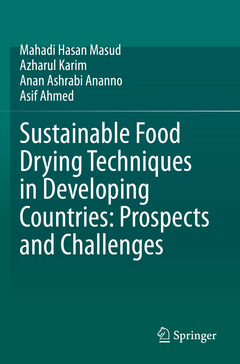Sustainable Food Drying Techniques in Developing Countries: Prospects and Challenges, 1st ed. 2020
Auteurs : Hasan Masud Mahadi, Karim Azharul, Ananno Anan Ashrabi, Ahmed Asif

This book presents a comprehensive review of renewable energy-based sustainable drying techniques for developing countries. Aspiring towards a world with zero food waste, the book has provided discussion on sustainable drying techniques in terms of energy efficiency. The socio-economic condition of each developing country is unique; therefore, has specific technological requirements. As such, the book presents discussions on food waste scenario around the world, the socio-economic status of developing countries and their correlation with food. The book gives an overview of the quality aspects of drying, along with the required energy and time to retain these features. Additionally, a method of selecting drying techniques for developing countries, taking the cost and safety factor into consideration, has been discussed extensively Also, the renewable and non-renewable energy resources of low income, lower-middle income, middle income, and high-income developing countries have been analyzed and presented. The book also highlights the available drying techniques that are currently being practiced by the consumers and industries of developing countries. The book recommends ten sustainable drying technologies for the developing countries and describes their working principle. Discussion on potential challenges for sustainable drying technology adoption is also presented. The book presents up-to-date research on sustainable drying techniques and their impact on developing countries to reduce food waste.
Food waste is not only a humanitarian concern but also a threat to environmental sustainability. Currently, one-third of all produced food is being wasted, when nearly 805 million people - including children remain undernourished on a daily basis. In an effort to solve this crisis, a number of food preservations techniques are being practiced in food supply chain. Drying is one such preservation technique that prevents microbial proliferation, slows enzymatic reaction and preserves the physio-chemical properties of food. Albeit, drying is an effective means of food preservation; it is also highly energy-intensive. Developing countries do not have sufficient energy and financial resources to adopt conventional (expensive and high energy) drying techniques. As such, this is the first reference work dedicated to discussing the prospects and challenges of sustainable (renewable energy based and inexpensive) drying techniques for developing countries in order to reduce food waste. Sustainable food drying techniques in developing countries: Prospects and Challenges is a singular work in the field of food preservation and affordable drying technology.
1. Insights into Drying
2. Energy Requirement in Drying
3. Energy Scenario in Developing Countries3.1 Total Energy
3.2 Non-Renewable Energy3.3 Renewable Energy
4. Existing drying Technologies in Developing Countries
4.1 Sun Drying
4.2 Solar Drying
4.2.1 Active solar drying
4.2.2 Passive solar drying
4.2.3 Mixed mode solar drying
4.2.4 Hybrid solar drying
4.3 Biomass dryer
4.4 Reversible air dryer SRA
4.5 STR Drying
5. Proposal of Sustainable drying techniques in Developing Countries
5.1 Improved Solar Drying
5.2 Geothermal Drying
5.3 Hybrid geothermal-solar drying
5.4 Heat pump drying
5.5 Drying using waste heat
5.6 Desiccant based drying
5.7 Improved Biomass Drying
5.8 Hybrid Solar-biomass drying
5.9 Solar derived IMCD
5.10 Osmotic dehydration
6. Challenges in Drying Sector
7. Conclusion
Mahadi Hasan Masud:
Mahadi Hasan Masud received his BSc and MSc in Mechanical Engineering from Rajshahi University of Engineering & Technology (RUET). He is now serving as a faculty member in Mechanical Engineering of RUET. Moreover, he is currently pursuing his PhD at RMIT University, Melbourne, Australia. Masud’s research focus is on advanced food preservation techniques, simultaneous heat and mass transfer, renewable energy resources, and biomimicry inspired vehicle design. He authored three popular books from the springer-nature publication, five book chapters, more than 20 refereed journal publications, and more than ten international conference publications. Most of his journal articles are published in highly ranked journals. He is a regular reviewer of several high ranked journals of prominent publishers, including Elsevier, Springer, Nature and Taylor and Francis.
Azharul Karim:
Dr Azharul Karim is currently working as an Associate Professor in the Mechanical Engineering Discipline, Science and Engineering Faculty, Queensland University of Technology, Australia. He received his PhD degree from Melbourne University in 2007. Through his scholarly, innovative, high-quality research, he has established a national and international standing. Dr Karim has authored over 194 peer-reviewed articles, including 94 high-quality journal papers, 13 peer-reviewed book chapters, and four books. His papers have attracted about 3100 citations with an h-index of 30. His papers have very high impact worldwide, as demonstrated by his overall field weighted citation index (FWCI) of 2.99. He is editor/board member of six reputed journals, including Drying Technology and Nature Scientific Reports and supervisor of 26 past and current PhD students. He has been keynote/distinguished speaker at scores of international conferences and invited/keynote speakers in seminars in many reputed universities worldwide. He won multiple international awar
Provides a critical analysis of drying techniques in developing countries and compares their total energy requirements
Investigates the factors influencing the adoption of renewable energy based drying technologies in developing countries
Proposes sustainable drying techniques for developing countries based on changing energy economy and unique geographical features. Addresses potential challenges in implementing renewable energy-based food drying techniques?
Date de parution : 05-2021
Ouvrage de 189 p.
15.5x23.5 cm
Disponible chez l'éditeur (délai d'approvisionnement : 15 jours).
Prix indicatif 105,49 €
Ajouter au panierDate de parution : 05-2020
Ouvrage de 189 p.
15.5x23.5 cm
Disponible chez l'éditeur (délai d'approvisionnement : 15 jours).
Prix indicatif 105,49 €
Ajouter au panierThèmes de Sustainable Food Drying Techniques in Developing... :
Mots-clés :
Renewable energy; Solar drying; Osmotic dehydration; Geothermal drying; Biomass drying
